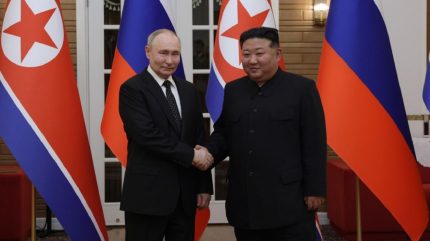
Given Russia’s huge losses in Ukraine, the US Department of Defense press secretary, Major General Pat Ryder, questioned North Korea’s decision to bolster the invader’s ranks in Ukraine.
When confronted by the prospect of a North Korean Army engineering unit being deployed to the Russian-occupied Donetsk region as early as next month – a move alluded to by South Korean media – Ryder commented:
“I think that if I were North Korean military personnel management, I would be questioning my choices on sending my forces to be cannon fodder in an illegal war against Ukraine.
“We’ve seen the kinds of casualties that Russian forces [are facing] but again, [this is] something that we’ll keep an eye on.”
Russian casualties in Ukraine
As Russia continues to make incremental gains west of Avdiivka and opened up a new northern offensive in the Kharkiv Oblast, an average daily casualty rate has pushed the number of Russian soldiers killed or wounded in action beyond 500,000.
Despite these losses, it is understood that Russia still retains the ability to recruit approximately 30,000 new personnel each month, making its losses, even those experienced in May, sustainable.
Should North Korea replenish Russian Army ranks with their own soldiers it would not be the first time that foreigners have fought in Russia’s Armed Forces against Ukraine.
Many foreign conscripts are economic migrants, most of whom come from Central Asia (primarily from Uzbekistan, Tajikistan and Kyrgyzstan), the Centre for Eastern Studies found. Others include citizens of Cuba, Nepal, Syria, Serbia, Afghanistan, Somalia and Malaysia. Their total number is probably in the thousands, although it is problematic to claim any specific figures.
A new level to their strategic partnership
Facing isolation on the world stage, the Russian President Vladimir Putin visited Pyongyang recently where he signed a strategic partnership treaty confirming reciprocal military guarantees with the totalitarian leader, Kim Jong Un, in the event that either of their territories are invaded.
After the visit the Kremlin publicised Putin’s thanks to North Korea in which he stated that the visit “has elevated relations between Moscow and Pyongyang to an unprecedentedly high level.”
This partnership builds on the stocks of weapons and military equipment that the former Russian Defence Minister Sergei Shoigu secured from North Korea during his visit to the newfound ally this time last year.
Only a month ago [May 2024], an unclassified report from the US Defense Intelligence Agency (DIA) confirmed that Russia had used ballistic missiles manufactured in North Korea in its war in Ukraine.
Through careful analysis of open-source imagery, intelligence analysts verified the debris found in Kharkiv on 2 January 2024 as missile debris from a North Korean short-range missile.




